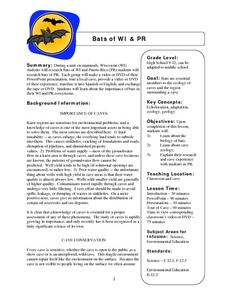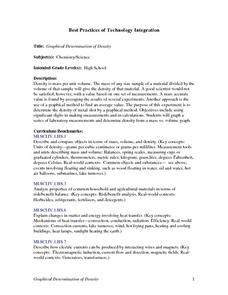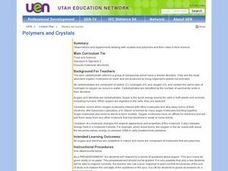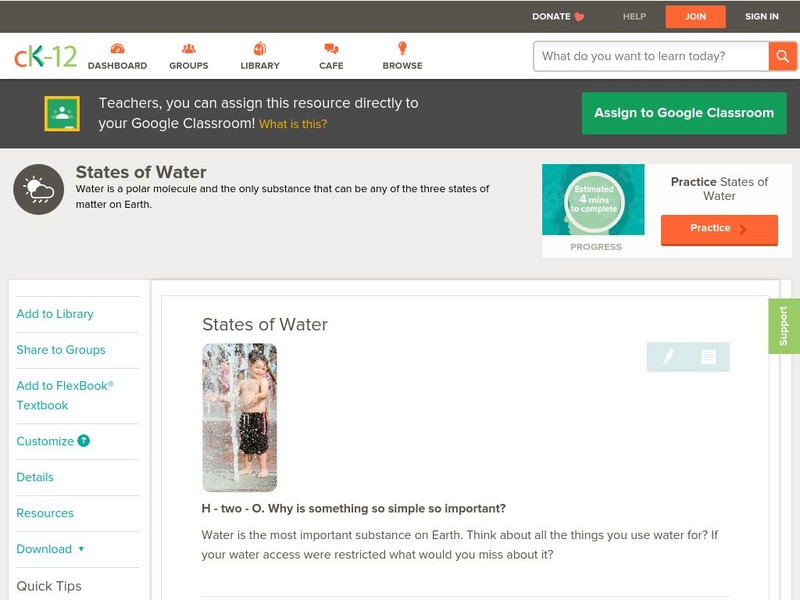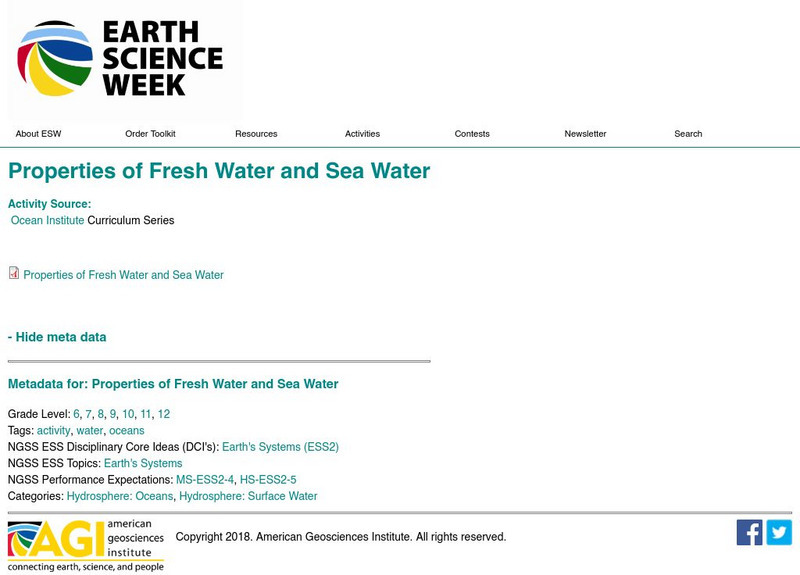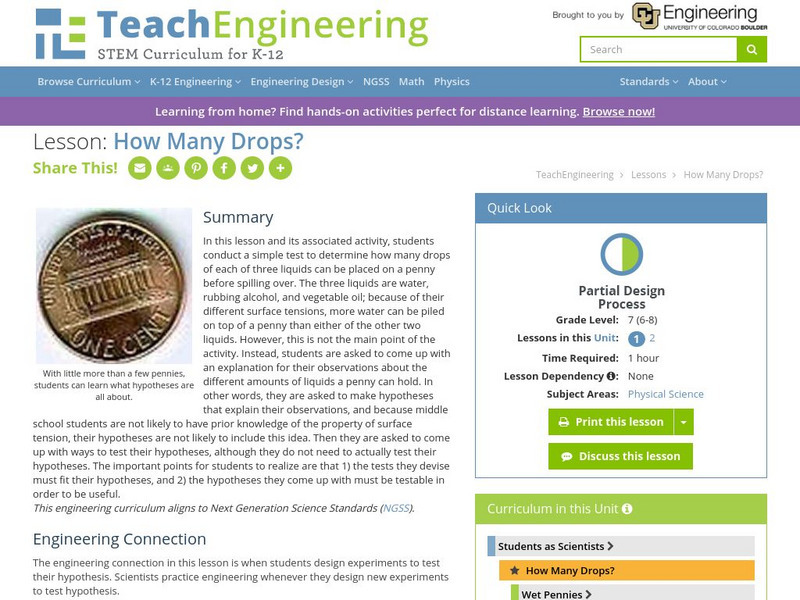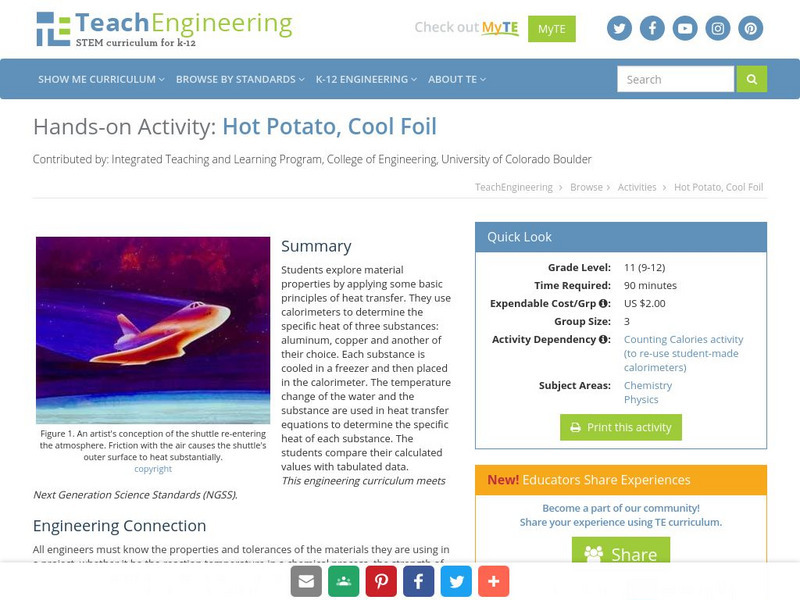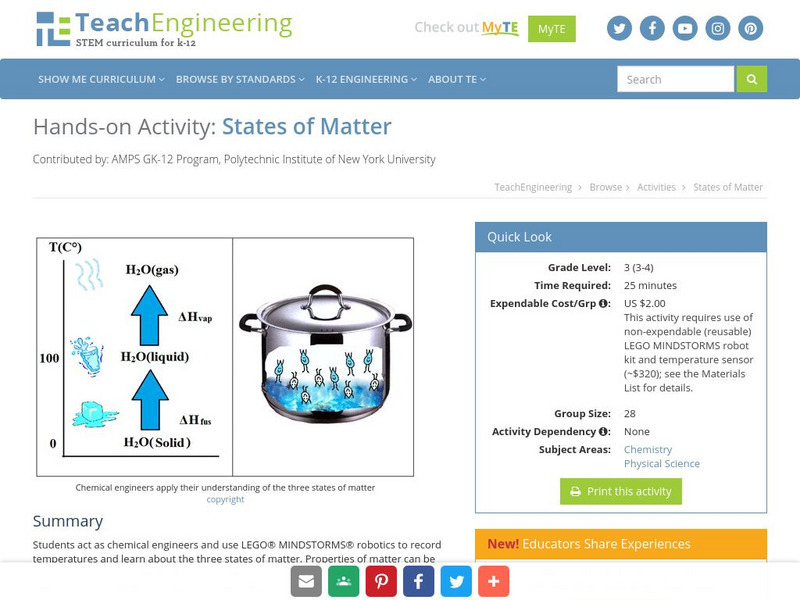Curated OER
A Simple Viscosity Test
Fourth graders experiment with the viscosity of different liquids. They use a stopwatch to time the a steel ball as it drops through different liquids.
Curated OER
Bats Of WI And PR
Students investigate the bats of Puerto Rico. They conduct research in order to find information to construct a powerpoint presentation. They create a dvd of the presentation and go on a tour to a local cave to see the environment where...
Curated OER
Surface Area and Volume of a Cylinder
Seventh graders find the surface area and volume of a cylinder. In this area and volume lesson, 7th graders complete several activities to learn the volume and surface area of cylinders.
Curated OER
Graphical Determination of Density
Students determine the density of metal shot by a graphical method using significant digits in making measurements and calculations. Students graph a seris of laboratory measurements and determine density from a mass verses volume graph.
Curated OER
CO Buildup City
Students conduct a controlled experiment. They collect data in an organized manner. Students analyze data to reach a conclusion and communicate findings. They explain how city size, temperature, and pollution is related to the air quality.
Curated OER
Where My Peeps At?
Learners conduct a series of activity that demonstrates Charles' and Boyle's Law. In this chemistry lesson, students determine the relationship among pressure, volume and temperature. They solve problems using mathematical equation.
Curated OER
Chemical Formulas Unit-Day 4
The purpose of this lesson involves reviewing nomenclature and molecular
formulas as well as introducing naming molecular compounds and identifying acids. The students investigate and understand how conservation of energy
and matter is...
Curated OER
Powered Up About Electricity!
Students study the process of turning coal into electricity. In this electricity instructional activity, students are guided by their teacher through the steps required to turn coal into electricity. Students complete a worksheet...
Curated OER
Polymers and Crystals
High schoolers experiment with crystals and polymers and examine their roles in food science.
Curated OER
How Can We Determine the Concentration of an Unknown Solution?
Students participate in experiments to help them determine the concentration of an unknown solution. They graph a standard curve and plotting the relationship between the concentration and the amount of light needed. They discuss their...
Curated OER
Creatures That Glow In The Night
Young scholars investigate the different bioluminescent organisms. They use microscopes in order to make observations and draw what is seen. Students demonstrate they have studies the differences between the process of photosynthesis and...
Curated OER
Weather Review
In this weather worksheet, students reviews terms associated with measuring different weather phenomena plus draw examples of different types of fronts on a weather map. This worksheet has 5 true or false, 15 matching, 21 multiple...
Curated OER
Where's the Evidence?
Eighth graders observe evidence of chemical reactions. In this chemical reactions lesson students study chemical processes and complete a lab activity.
New York University
Nyu: Welcome to Water
Educational resource invites users to understand the properties of water by first examining what water is and how we use it and then leads users to further information on the three states that water can exist.
CK-12 Foundation
Ck 12: Earth Science: States of Water Study Guide
[Free Registration/Login may be required to access all resource tools.] This study guide summarizes key points about the three states of water. Includes a few questions to check for understanding.
CK-12 Foundation
Ck 12: Earth Science: States of Water
[Free Registration/Login may be required to access all resource tools.] Describes the three states of matter of water.
CK-12 Foundation
Ck 12: Earth Science: States of Water
[Free Registration/Login may be required to access all resource tools.] Describes the three states of matter of water.
New York University
New York University: States of Water
Use this resource to learn about the three different phases of water; solid, liquid, and gas. What happens to water as it changes into a solid or gas? Includes short and easy to do activity.
American Geosciences Institute
American Geosciences Institute: Earth Science Week: Properties of Fresh Water and Sea Water
Students set up three demonstrations to observe the properties of water. They explore the boiling point of water, the freezing point of water, and the ability of water to store heat.
TeachEngineering
Teach Engineering: Students as Scientists
This curricular unit contains two lessons that let students actually do the work of scientists as they design their own experiments to answer questions they generate. In the first lesson and its associated activity, students conduct a...
TeachEngineering
Teach Engineering: How Many Drops?
In this lesson and its associated activity, students conduct a simple test to determine how many drops of each of three liquids can be placed on a penny before spilling over. The three liquids are water, rubbing alcohol, and vegetable...
US Geological Survey
U.s. Geological Survey: Greenhouse Gases [Pdf]
Lesson plan in which students observe and contrast thermal properties of three major greenhouse gases. Using simple, readily available materials, students collect temperature change over time for dry air, water-saturated air, carbon...
TeachEngineering
Teach Engineering: Hot Potato, Cool Foil
Students explore material properties by applying some basic principles of heat transfer. They use calorimeters to determine the specific heat of three substances: aluminum, copper and another of their choice. Each substance is cooled in...
TeachEngineering
Teach Engineering: States of Matter
Students act as chemical engineers and use LEGO MINDSTORMS NXT robotics to record temperatures and learn about the three states of matter. Properties of matter can be measured in various ways, including volume, mass, density and...



